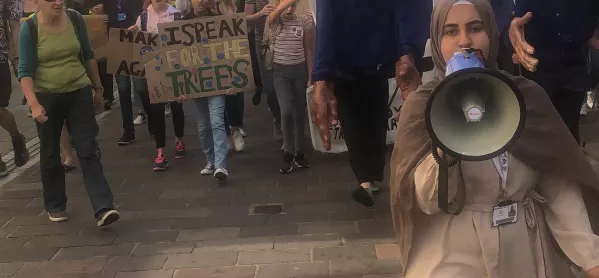- Home
- Our voices must be heard on Covid-19, students plea
Our voices must be heard on Covid-19, students plea

I think it is very clear that students have been completely let down during this pandemic. Even now that colleges have reopened, it should be obvious to anyone who interacts with students that the problems have not gone away, that many are still trying to access education and continue their learning.
Every day I hear these stories, every day that I speak to a student who does not have the equipment they need to learn, or who is suffering from a mental health condition and receiving inadequate support, and I feel increasingly frustrated. Because the simple truth is that much of this could have been avoided.
At the National Union of Students we have been warning about the issues that Covid-19 would cause to FE students since March, and I know that many MPs and student officers have also been very vocal on this. Yet we are still being ignored.
Coronavirus: ‘Intense’ Covid transmission from 17- and 18-year-olds
GCSE resits: November exams ‘pose public health risk’
Meet Salsabil Elmegri: NUS’ new VP further education
‘Students are crying out for more support’
No situation proves that more than the exams fiasco, and fiasco is the only word that can be used to describe it. We warned the government and Ofqual of the problems in the system when it was first designed, yet they persevered with this clearly unjust algorithm.
We warned them again in the weeks leading up to results day, and even the day before, urging them to change course. But they were more concerned with the supposed problem of grade inflation than individual students’ futures. They were willing to sacrifice a whole cohort of students from disadvantaged backgrounds and assign them grades based on where they come from. To me, that speaks volumes.
And so we are seeing many of these same problems that emerged (as we predicted) last year continue. Digital poverty is affecting so many students in colleges across the country. As our research showed, of those offered online learning last term, one in four were unable to access this.
That figure is simply unacceptable and not enough has been done to combat this. Many students still do not have access to laptops or good enough wi-fi connections to be able to learn remotely. Even for those that do have this, trying to find a quiet space at home that is conducive to learning can often be impossible.
Students are crying out for more support. They need more investment in digital technology, well-resourced mental health services and transport networks that can take us to our colleges safely.
But even more essential than that, we need people to listen to us. Many attendees today have spoken about their experiences with student engagement. Improvements might have been made in HE but those same systems do not exist yet in FE and we all need to do more to empower students to speak up.
‘MPs, we need you to be our champions’
MPs, we need you to listen to us. Go out to your local college, if it is safe to do so. Get in touch with their SU or students directly and just listen to the concerns that they have. Because not enough people are doing this. We need you to be our champions, to fight for us in Parliament and make our voices heard. This pandemic is hitting us so hard, and we need more support.
However, we must also look at the bigger picture, and not let the pandemic distract us from many of the other challenges that we face. Big changes are coming to the FE sector very soon, and we need these to be directed towards making it easier for students to access education. This simply will not happen unless student representatives are at the table when those decisions are being made.
Similarly, there is a climate emergency and we cannot ignore this. We need to recognise how our educational institutions contribute to this emergency, and put pressure on our colleges to become carbon neutral.
Covid-19 is creating many new challenges for students and these need to be solved, but it is also exposing the same problems that were always there. Digital poverty is nothing new, there has been a mental health crisis in education for a number of years and educational inequality has been ever-present. So we need to tackle these issues head-on, rather than introducing temporary fixes.
Salsabil Elmegri is the NUS vice president for further education. This blog formed part of a speech at an APPG on FE students’ return to college during the coronavirus pandemic
Keep reading for just £1 per month
You've reached your limit of free articles this month. Subscribe for £1 per month for three months and get:
- Unlimited access to all Tes magazine content
- Exclusive subscriber-only stories
- Award-winning email newsletters